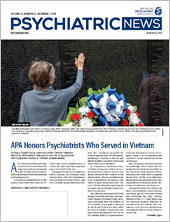In my remarks at the APA Assembly meeting in November (see page 5), I expressed concern about how current events and violent incidents are causing significant distress in our nation’s population, including our patients, to which we, as psychiatrists, must pay attention. Whether it’s threats of possible terrorist acts, concerns about climate change, an increasing number of hate crimes, the occurrence of natural disasters, the seemingly endless episodes of mass shootings, and other acts of violence or the angry rhetoric and politics of a deeply divided America, more and more people are reporting anxiety and stress affecting them, their relationships, and their functioning.
I find myself in total agreement with Dr. Stephen J. Rockower, a former president of the Maryland Medical Association. In a president’s message published in Maryland Medicine in 2017, “Reflections on Political Machinations,” he wrote, “We are experiencing a very strange time in America.” We have policies and ethical rules that define and oppose discriminatory speech and inappropriate behavior at professional gatherings, for example, but we now live in a time when we are unable to prevent suicide by a 9-year-old due to relentless bullying. Have we gone a “bridge too far”? And if so, how do we help those who seek our assistance in dealing with these mostly social, perhaps preventable, and definitely traumatic experiences in our society? How do we, as psychiatrists, use our voice? Similar to the children’s game of “connect the dots” to reveal a familiar image, I think it is time that psychiatrists assist the public in understanding and dealing with the repercussions of these troubling issues.
I have always considered medicine to be a form of servant leadership. As a psychiatrist who primarily practices in community-based settings, I look for population-based, public health approaches for dealing with the psychological distress experienced by those in the communities in which I work based on their environment or life situation. These adverse experiences can create an “us versus them” narrative and psychological distress that stirs fear and distrust of each other. As psychiatrists who understand the importance of using a holistic, biopsychosocial approach to helping people, we are uniquely skilled to deal with these issues and must not remain silent.
These days I am often reminded of a famous quote: “All that is necessary for evil to triumph is for good men to do nothing.” When I consider how that observation applies to the role of psychiatry in today’s world, I would say that we cannot afford to be complacent about certain actions and events that go against long-established norms, basic civility, and even the law.
In a tweet last month after the Annals of Internal Medicine published research on firearm injuries and deaths and recommendations to reduce gun violence, the National Rife Association told physicians to “stay in their lane.” Indeed, we are in our lane—for the sake of our patients and others, we are exactly where we should be. APA will continue to speak out as an organization on issues for which we have established a position or policy statement and join with our allied groups to push back on harmful policies and rules proposed or made by those in positions of power and influence.
In the meantime, we members must speak out, use our specialized training and expertise for the public’s benefit, and apply it to not only healing, but also preventing psychological trauma and senseless tragedies. So, considering the current climate of hateful and divisive rhetoric that leads to senseless violence and tragic loss of life, let’s be proactive and use our voices to fight back with the wisdom and knowledge we have worked so long to achieve. This is the lane where we belong. ■
Many thanks to Dr. James Fleming (Missouri APA Assembly representative) and Dr. Harold Eist (APA past president) for their inspiration for this column.

